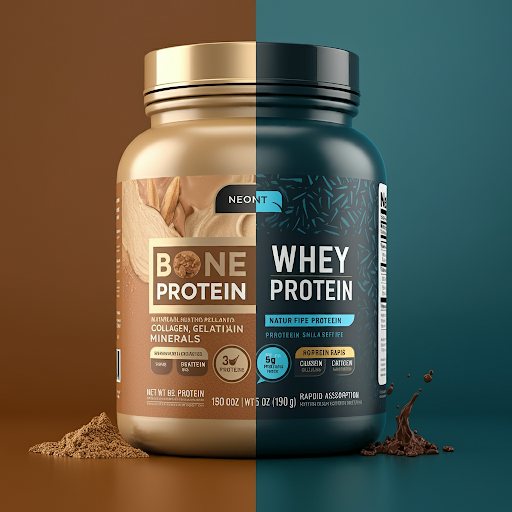
Bone Broth Protein vs. Whey Protein: The Ultimate Guide to Optimized Muscle Growth and Recovery
When it comes to choosing the best protein supplement for muscle growth and recovery, the debate between bone broth protein and whey protein often arises. While each has unique advantages, bone broth protein stands out as a versatile, nutrient-dense option that goes beyond muscle-building benefits. Here's a detailed comparison of these protein powerhouses and how you can maximize their benefits for optimal results.
Protein Content and Muscle Growth
Bone broth protein delivers approximately 20 grams of protein per serving, comparable to most whey protein supplements. Research indicates that consuming 20-40 grams of protein post-exercise is effective for muscle protein synthesis and growth. However, whey protein has a slightly higher concentration of branched-chain amino acids (BCAAs), such as leucine, which are directly linked to muscle growth and recovery.
But here's the limitation: whey protein lacks collagen, an essential component for joint health, connective tissue repair, and overall structural support. Bone broth protein, on the other hand, is rich in collagen peptides and only slightly lower in BCAAs—making it a dual-purpose supplement for both recovery and joint health.
Collagen and Joint Health
Collagen, a key component of bone broth protein, supports joint health and connective tissue repair. Studies suggest that collagen-rich proteins can reduce joint pain and improve mobility, especially in individuals with osteoarthritis. For athletes, this translates to better training consistency and enhanced recovery.
Whey protein, while effective for muscle repair, lacks collagen and does not directly support joint health. This absence could lead to gaps in recovery for those engaging in high-impact or intense physical activities. Collagen peptides have been shown to improve the extracellular matrix of connective tissues, enhancing structure and load-bearing capabilities.
Body Composition Benefits
Research on collagen peptide supplementation, a component of bone broth protein (and protein in general), demonstrates its ability to:
- Increase fat-free mass
- Improve muscle strength
- Reduce fat mass
While these results were observed in elderly men with sarcopenia, they hint at the potential for body composition improvements across other populations. Whey protein also supports lean muscle growth, but its benefits stop short of bone broth’s holistic impact on joint and connective tissue health.
Amino Acid Profile: A Balanced Approach
Bone broth protein features an amino acid profile high in glycine, proline, and hydroxyproline, which are essential for collagen synthesis. Yes, the collagen-forming amino acids in bone broth protein provide additional benefits for recovery and overall health. No single protein powder is perfect, but bone broth protein offers a unique balance of structural and recovery-enhancing properties.
For optimal results, supplementing bone broth protein with essential amino acids (EAAs) like FundAminos can create a comprehensive amino acid profile. This combination ensures you're not only supporting muscle growth but also enhancing recovery, connective tissue repair, and overall well-being.
Nutrient Density and Additional Benefits
Bone broth protein is more than just a protein source—it’s a nutrient-dense powerhouse. It contains:
- Collagen, which support joint health and tissue repair.
- Anti-inflammatory amino acids like glycine, which aid in recovery and overall health
- Natural composition free from common allergens and artificial ingredients, making it ideal for individuals with sensitive digestive systems
Whey protein, while effective for muscle building, is often associated with gastrointestinal discomfort, allergic reactions, and potential concerns about source quality.
The Verdict: Bone Broth Protein or Whey? The Overall Winner
While whey protein is effective for muscle-building, it doesn't provide the same comprehensive benefits when it comes to joint health, connective tissue repair, or overall nutrient density. Bone broth protein, on the other hand, stands out for its holistic approach to recovery. It not only supports muscle growth but also offers critical nutrients that promote joint health, enhance connective tissue repair, and contribute to overall wellness. With its abundance of collagen, amino acids, and other essential nutrients, bone broth protein is a more well-rounded option for individuals seeking long-term recovery, joint support, and enhanced muscle health. This makes it an ideal choice for those looking to improve overall physical health while still supporting muscle development.
To maximize the benefits of bone broth protein, consider:
- Supplementing with essential amino acids like FundAminos
- Choosing a high-quality, whole-food protein source like PureClean Protein, which combines collagen peptides with traditional proteins for a complete protein profile.
Why PureClean Protein is the Superior Choice
PureClean Protein stands out by combining the structural benefits of collagen peptides with the muscle-building power of traditional proteins. Unlike whey or plant proteins, it delivers the full spectrum of amino acids necessary for optimal recovery, joint health, and muscle performance.
Additionally, PureClean Protein avoids the pitfalls of many whey products, such as:
- GI distress and allergen issues
- Lower-quality sources and additives
By embracing bone broth protein and supplementing strategically, you’re not just supporting muscle growth—you’re optimizing your body for long-term health and performance. With PureClean Protein and FundAminos, you’re equipped with the ultimate tools for recovery, strength, and vitality.
